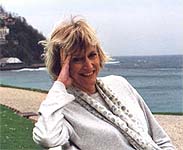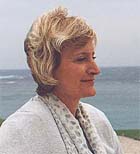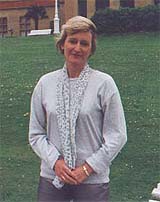 Sandy Ott was born quite
far away from the Basque Country, in the United
States, and she first heard of the Basque Country
through her former husband. As soon as her
interest for the Basques arose in 1976, she
decided to go to Iparralde, to Santa Engrazi, to
carry out some anthropologic research. She did
not only get to know the culture of the land, but
she was also able to learn Basque from Soule. She
now works in Oxford University, but she still
retains her interest for Basque culture and she
intends to come to the Basque Country as soon as
possible. Sandy Ott was born quite
far away from the Basque Country, in the United
States, and she first heard of the Basque Country
through her former husband. As soon as her
interest for the Basques arose in 1976, she
decided to go to Iparralde, to Santa Engrazi, to
carry out some anthropologic research. She did
not only get to know the culture of the land, but
she was also able to learn Basque from Soule. She
now works in Oxford University, but she still
retains her interest for Basque culture and she
intends to come to the Basque Country as soon as
possible.
.-When
did you start your anthropological researches?
I first became interested in the Basque
people and culture as I was finishing my B.Litt.
at Oxford. I had done fieldwork in Ireland and
wished to remain in Europe for my D.Phil.
research; but I did not want to go to Italy,
Greece or Spain, where so many social
anthropologists had already been. I owe a debt of
gratitude to my ex-husband, Peter Riviere, for
having suggested the Basques to me. I admired
Bill Douglass's work and contacted him at Reno. I
also contacted Professor Julian Pitt-Rivers, then
head of the anthropology department at the London
School of Economics. He had a long-standing
interest in the Basque Country. Bill suggested I
do fieldwork in the Iparralde and I went there in
July 1976. At his suggestion I went to see Eugene
Goyheneche, who himself recommended Santazi to me
as an interesting Basque-speaking community. I
went there with him to see the Santa Graziko
pastoral that summer.
-Why did you
start to study the Basques?
I was drawn to study the Basques because of their
status as "the mystery people of Europe"
who spoke a difficult and unusual language and
had interesting customs.
 -How
did you arrive to Santa-Grazi? -How
did you arrive to Santa-Grazi?
In my doctoral thesis and subsequent
publications I tried to provide an analysis of a
Basque community unlike others that had been
published and which sought to identify the
primary organising notions and social
institutions underpinning Santagrazi society. In
1976 I studied a community that had undergone
significant change but which was to change even
more in the 1980s. My book captures the society
as it was then.
-When you
are with "your Zuberoan family", do you
speak Basque to them?
My first impressions of Santagrazi were
recorded on that hot, July day when Eugene and I
drove to see the pastoral, which was set in a
green field with the gorge of Ehujarre as its
backdrop. A gorgeous setting. Most of the
Santaztarrak attended. When I then went with
Txomin Peillen to his first neighbour's house in
search of a house for me to stay in, I was struck
by the warmth of people and their keenness to
help me. They knew I wanted to learn Euska plana,
as they call their Basque, and were pleased by
that interest. I found my household within three
days and have been in touch ever since.
-What does
an American scientst like you think about us?
When I am in Santazi I always speak Zuberoan
Basque. I make lots of mistakes, for my grammar
is far from perfect; but I always make myself
understood and it is rare that I cannot follow a
conversation. I have, however, lost some of my
vocabulary; but I am sure that by staying in the
community a week or so I could recover what I
have lost over the years.
-What would
you highlight about Basque identity?
For me, the Basque people are the most
generous people I have ever known. I have been in
many different parts of the Basque Country, for
varying lengths of time; and I have without
exception been made to feel welcome. I admire the
Basques for their cultural pride and
determination, for their industriousness and
commitment.
 -At
present, what are your plans? -At
present, what are your plans?
At present I have virtually no time in
which to carry out any academic work; for my
duties as a senior university administrator are
full time and demanding. However, Oxford
University has permitted me to take six months'
unpaid leave from January 2000. During that
period of leave I intend to finish a book that I
started in the early 1980s, to enjoy the luxuries
of reading and writing and participating actively
in an international academic community.
-Will you
return to the United States?
I plan to be in Oxford for much of my leave but
will also spend time in Euskadi and perhaps will
be a visiting academic at the University of
Nevada's Basque Studies Program. I have no idea
what the future will bring; but I hope it will
enable me to return to my academic work.
-How did you
become an university administrator in Oxford?
I became a university administrator first
in Donosti as the first director of what is now
USAC. I took up my present post in 1989 as head
administrator in Continuing Education at the
University of Oxford.
 -Being
a Visiting Basque Fellowship at Oxford, what does
it mean? -Being
a Visiting Basque Fellowship at Oxford, what does
it mean?
Three years ago we revived the Visiting Basque
Fellowship at Oxford, with the help of Lord
Jenkins of Hillhead. The fellowship is once again
based at St Antony's College and offers scholars
from the Basque Country an invaluable opportunity
to spend an academic session in Oxford, writing
and doing research and establishing links with
academics here. The fellowship is now well
established again; but we rely upon fellows to
continue to contribute to the scheme after their
stay here by keeping in touch with UK scholars
and promoting the exchange of scholarly ideas and
information between the Basque Country and
Britain. I would like to see more workshops or
seminars in the Basque Country organised as
follow-up activities to events held in Oxford.
This would further strengthen ties between us.
-What can
this Fellowship offer to science?
There are numerous schemes in the United
States that offer similar opportunities for
visiting scholars. The success of our visiting
fellowship depends upon the fellows themselves,
and relies not only upon the quality of their
academic work but also on their fluency in
English, their participation in academic life,
both in the faculties to which their academic
interests correspond and at St Antony's College,
and their personal efforts to establish scholarly
links between UK and Basque scholars.

SANDY OTT
(Corry Pennsylvania - USA)
|
- Studies
- BA (hons.)
Pomona College, Claremont,
California
- Diploma
in Social Antropology, B.
Litt. Social Antropology,
D. Phil
Social Antropology,
Wolfson College,
University of Oxford
- Work
Curriculum
- 1980-1981:
Temporary Lecturer in
Ethnology, University of
Oxford
- 1982-1985:
Temporary Lecturer in
Social Antropology,
Oxford Brookes University
- 1983-1986:
Director of the
University Studies Abroad
Consortium
(University of Nevada and
Euskal Herriko
Unibertsitatea), Donostia
- 1986-1989:
Director of the Ithaca
College London Centre, UK
- 1989
to present:
Departmental
Administrator, Continuing
Education, University of
Oxford
- Publications
- 1979:
Aristotle Among the
Basque: The Cheese
Analogy of Conception Man,
Vol. 14, 699-711
- 1980:
Blessed Bread, First
Neighbours and Asymmetric
Exchange in the Basque
Country. Archives
Europeennes de Sociologie,
Vol. XXI, 40-58.
- 1981:
The Circle of
Mountains. A Basque
Shepherding Community.
Oxford: Clarendon Press.
- 1989:
Mariage et remariage
dans une communaute
mortagnarde du Pays
Basque. In JG
Peristiany (de) Le prix
de l'alliance en
Mediterranee, 249-270
- 1992:
Indarra: Some
reflextions on a Basque
concept. In J Pitt-Rivers
(de) Honor and Grace in
Antropology. Cambrigde:
Cambridge University
Press, 193-214.
- 1993:
paperback, revised
edition of The Circle
of Mountains (Reno,
University of Nevada
Press)
- 1993:
French edition
- 1994:
Basque edition
|
Fotografías:
Maria Agirre |